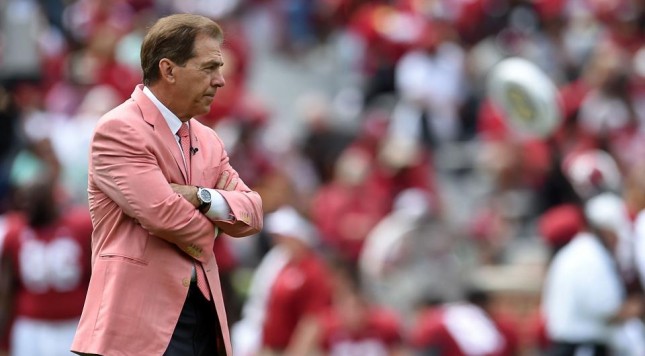Where do Alabama and Nick Saban stand in the larger theater of college football, and in the pantheon of the sport’s history?
These topics are the talk of the village this week… if your village cares about college football, at any rate. We have a long offseason ahead of us, especially if you’re not into the whole recruiting business. Let’s take some time to chew our food… food for thought on Alabama’s place in the sport.
In this piece, consider the best possible argument to make for the Crimson Tide and their coach. Weigh it against the best possible rebuttal and see where you stand on the matter.
*
Four national titles in seven seasons. Let’s start there.
Being the best in a majority of seasons over more than two-thirds of a decade is pretty remarkable. Let’s be more precise: Alabama isn’t just a program which is “generally the best,” always in the mix for national titles and in the final three groupings of a major golf tournament on the final Sunday. The Tide aren’t merely closer to the national title each season than all other competitors (Ohio State being second). No, Alabama is more than that — the Tide have specifically been the best, number one, in a majority of the past seven seasons.
USC from 2003 through 2005 could have produced a legendary three-year run, but it needed to beat Texas in the 2006 Rose Bowl and failed, albeit barely. Miami didn’t even win a second national title, falling just short in the 2003 Fiesta Bowl against Ohio State.
Being the best in a majority of seven years? That’s something which belongs on Mount Olympus, next to Bud Wilkinson’s 1950s Oklahoma teams (with their 47-game winning streak), Miami from 1986 through 1991, and Frank Leahy’s Notre Dame teams in the 1940s.
Moreover, Alabama has done what it has done in an era with more regular season games (12), a conference championship game, and now a College Football Playoff. Strictly in terms of the number of games played and the different kinds of on-field obstacles a team must overcome, it is harder to win today than it was in previous decades, especially those decades confined to the 20th century.
The scrutiny placed on coaches and athletes is greater and more intense than ever. The pressure associated with competition is more suffocating than it was in the past. It’s so much easier for players to be distracted. Football has become so much more specialized that any loss of an assistant coach or someone on the support staff can have a significant effect on results and performance. The organism of football is more fragile than it once was.
Yet, Alabama has won four out of seven national crowns.
Then comes the knockout punch: Saban has won those four titles with Greg McElroy, A.J. McCarron, and Jacob Coker as his quarterbacks.
Come on.
McCarron did deserve to be a Heisman Trophy finalist in 2012, but in 2011, he was a much less polished player than he became the following season, when he blossomed. Saban won three of his four national titles in Tuscaloosa quarterbacks who might have played a dazzling game here or there, but were best described as “adequate” or “decent” or “solid,” not anything close to flashy or imposing.
Did he have all the right players at just about every position? Sure he did. Yet, let’s not kid ourselves: Quarterback is the most important position in college football, something which could not be said (at least not with the same degree of confidence) in 1982, when Bear Bryant coached his last game for Alabama. Back then, college football was a running back’s sport, making the left and right tackles the most important positions on the field (at least to a much greater extent).
In many ways, Nick Saban’s greatness as a coach might lie in the fact that he made the playoff in 2014 with Blake Sims. The man simply achieves high-level results no matter the quarterback he has. He won an SEC West title and came close to an SEC championship (and national title game appearance) with John Parker Wilson as his signal caller.
Critics will note all the home-field losses in national title seasons (2011, 2012, and 2015), but Alabama always regrouped from them. The Tide would have smashed Oklahoma State in 2011 if given the chance to play the Cowboys — how many people doubt this, regardless of their views of the mechanics of the BCS that season? That’s with a not-yet-there McCarron at quarterback, too.
Saban has won at least 12 games (yes, at LEAST!) in six of the past eight seasons. An 11-win season is, objectively — when measured against most of his seasons at Alabama — a disappointment for himself and the entire program (and university).
This is all at a time when it’s never been harder to win the national championship.
The defense rests, your honor.

